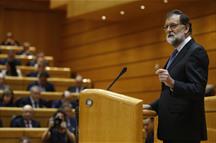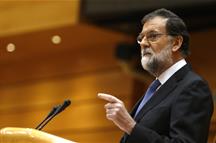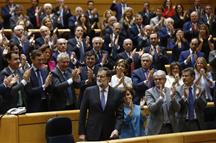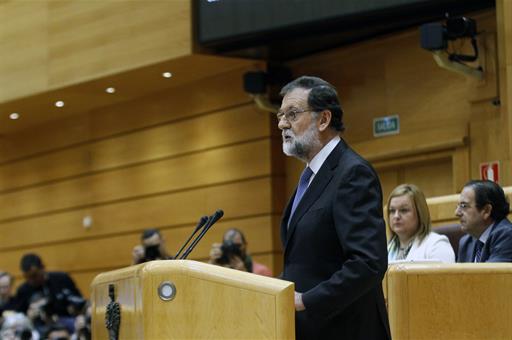"There is no choice; all we can do - and must do - is apply the law for the very purpose of enforcing the law", says Mariano Rajoy
President's News - 2017.10.27
Upper House of Parliament, Madrid
The President of the Government has requested approval from the Upper House of Parliament for the measures that the Council of Ministers "presented for public opinion" on Saturday under which application of Article 155 of the Spanish Constitution will be set in motion. Mariano Rajoy acknowledged that this is "an exceptional decision" being adopted "in an exceptional situation with very serious consequences for many people".
Mariano Rajoy recalled the events of recent months in Catalonia, such as the attempt to "ignore the law, including the Spanish Constitution and the Statute of Autonomy of Catalonia". Furthermore, "a new legal situation was approved by those with no powers whatsoever to do so" and "the members of the opposition were refused their right to act as such". In this regard, he described the events on 6 and 7 September in the Parliament of Catalonia as "the greatest affront to democracy".
Breaking the law and fracturing society
 Pool Moncloa/Diego CrespoThe President of the Government stressed that the Constitutional Court has successively annulled all the decisions reached by the Catalan authorities, but this has been "ignored". He also said that "they claim the people of Catalonia have freely opted for independence" even though "this is based on an illegal referendum with no democratic guarantees whatsoever".
Pool Moncloa/Diego CrespoThe President of the Government stressed that the Constitutional Court has successively annulled all the decisions reached by the Catalan authorities, but this has been "ignored". He also said that "they claim the people of Catalonia have freely opted for independence" even though "this is based on an illegal referendum with no democratic guarantees whatsoever".
In short, Mariano Rajoy said "we are facing a clear and evident breach of the law and therefore democracy and everybody's rights". "When the law is broken, society is fractured, our rights can no longer be guaranteed, the strongest impose themselves on the weakest, minorities no longer count, democracy is damaged and we are weakened", he said.
Mariano Rajoy also referred to the "very serious" economic consequences of "disregarding the law". He said that financial institutions and companies are leaving, deposit holders are questioning their position, investment is weakening and "economic growth and employment are beginning a downturn".
Furthermore, Mariano Rajoy said that, by accepting these pro-sovereignty intentions, Catalonia would leave the European Union and its institutions because this process "goes against the principles and values that underpin Europe", a process in which he sees "nothing good" besides "serving to expose the lies and those who spread them".
Article 155
In reference to the application of Article 155 of the Spanish Constitution, the President of the Government stressed that "there is no choice" and that "all we can do and - moreover - must do in a situation such as this is to apply the law for the very purpose of enforcing the law". He explained that it is a "legal, democratic mechanism" and one "approved by the people of Spain".
After insisting that "this procedure is being launched on countless grounds", Mariano Rajoy added that "exceptional measures should only be adopted when there is no other possible remedy to correct a situation that is also exceptional and contrary to the general interest". The goal is "to restore law, democracy and stability in an autonomous region whose leaders have wiped out the Spanish Constitution, mistreated social harmony, engaged in open defiance of territorial unity and caused serious economic uncertainty".
The President of the Government of Spain recalled that he sent Regional President Puigdemont a formal demand - with two deadlines - to clarify whether he had declared independence or not. In the absence of a response from the President of the Regional Government of Catalonia, the Government of Spain was forced to continue with the process. "He is the one who has chosen to go ahead with the process to trigger Article 155 of the Spanish Constitution. He, and he alone", said Mariano Rajoy.
Goals and measures
Mariano Rajoy explained that four goals are sought by triggering Article 155: restoring the law; recovering confidence; maintaining the "seriously damaged" high levels of economic growth and job creation seen in recent years; and holding elections "in a situation of institutional normality".
 Pool Moncloa/Diego CrespoThe President of the Government also referred to the measures that will be implemented if the Upper House of Parliament approves them. He explained that "the power to dissolve the Regional Parliament of Catalonia will pass over to the President of the Government of Spain, who must call elections within maximum a period of six months". However, he clarified that his "wish is to hold those elections as soon as possible".
Pool Moncloa/Diego CrespoThe President of the Government also referred to the measures that will be implemented if the Upper House of Parliament approves them. He explained that "the power to dissolve the Regional Parliament of Catalonia will pass over to the President of the Government of Spain, who must call elections within maximum a period of six months". However, he clarified that his "wish is to hold those elections as soon as possible".
He also asked for "the Government of Spain to be authorised" to dismiss the President of the Regional Government of Catalonia, the Vice-President and the regional councillors "that make up the Regional Council of Ministers". He added that "exercise of those functions will correspond to the bodies or authorities that the Government of the Nation creates or appoints to that end". At any event, "the Parliament of Catalonia will exercise the representative duties assigned to it", even though it will not be able to propose a candidate for President of the Regional Government of Catalonia or hold an investiture debate.
Dialogue
Mariano Rajoy stressed that dialogue has been practised "for many years" in Spain "in all facets of life". However, he explained that this has not been the case on this occasion. "The only negotiation to which I was invited as President of the Government of Spain was to discuss the terms and deadlines for the independence of Catalonia", he said, and that was something I could not accept.
Furthermore, the President of the Government recalled that Carles Puigdemont refused to attend the Conference of Regional Presidents to participate in the negotiations on regional financing. He also refused to appear in both the Lower House of Parliament and Upper House of Parliament when given the chance to do so.
Consolidating the autonomy of Catalonia
 Pool Moncloa/Diego CrespoThe President of the Government underlined that activation of Article 155 is not taking place "against Catalonia but rather to prevent the abuse of Catalonia". The intention is not to suspend its autonomy but rather to "consolidate it". Neither is the goal "to restrict liberties and rights but rather to protect them by putting an end to illegal actions", he said.
Pool Moncloa/Diego CrespoThe President of the Government underlined that activation of Article 155 is not taking place "against Catalonia but rather to prevent the abuse of Catalonia". The intention is not to suspend its autonomy but rather to "consolidate it". Neither is the goal "to restrict liberties and rights but rather to protect them by putting an end to illegal actions", he said.
According to Mariano Rajoy, "the threat to Catalonia today is not Article 155 but rather the attitude of the Regional Government of Catalonia", meaning that "Catalonia needs to be saved not from the application of an article in the Spanish Constitution but from the criminal damage being caused by anti-constitutional conduct".
Lastly, after stressing that we face "a challenge of unprecedented proportions in our recent history", the President of the Government, Mariano Rajoy, insisted that "it affects all of Spain, its laws, its principles and the rules underpinning social harmony". The question is, said the President of the Government, whether we should recognise "the existence of unequal categories among our citizens" in exchange for "appeasing this defiance".
Non official translation





